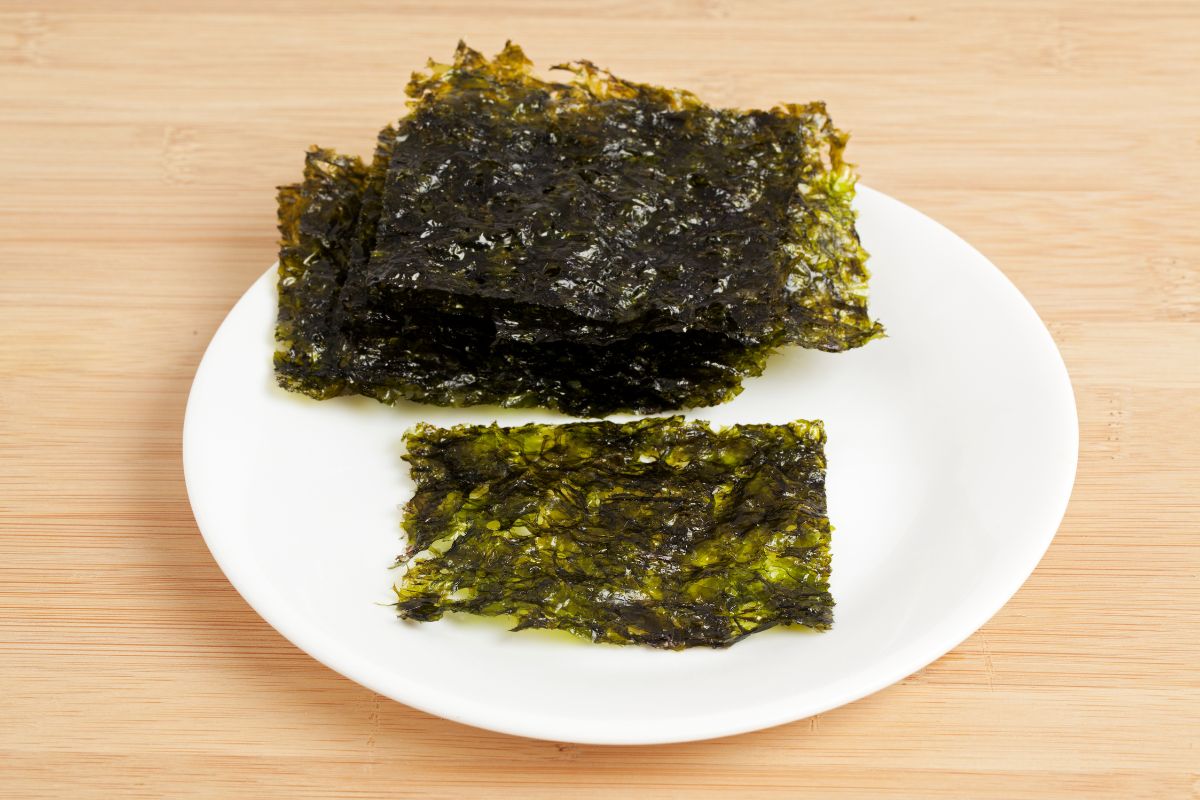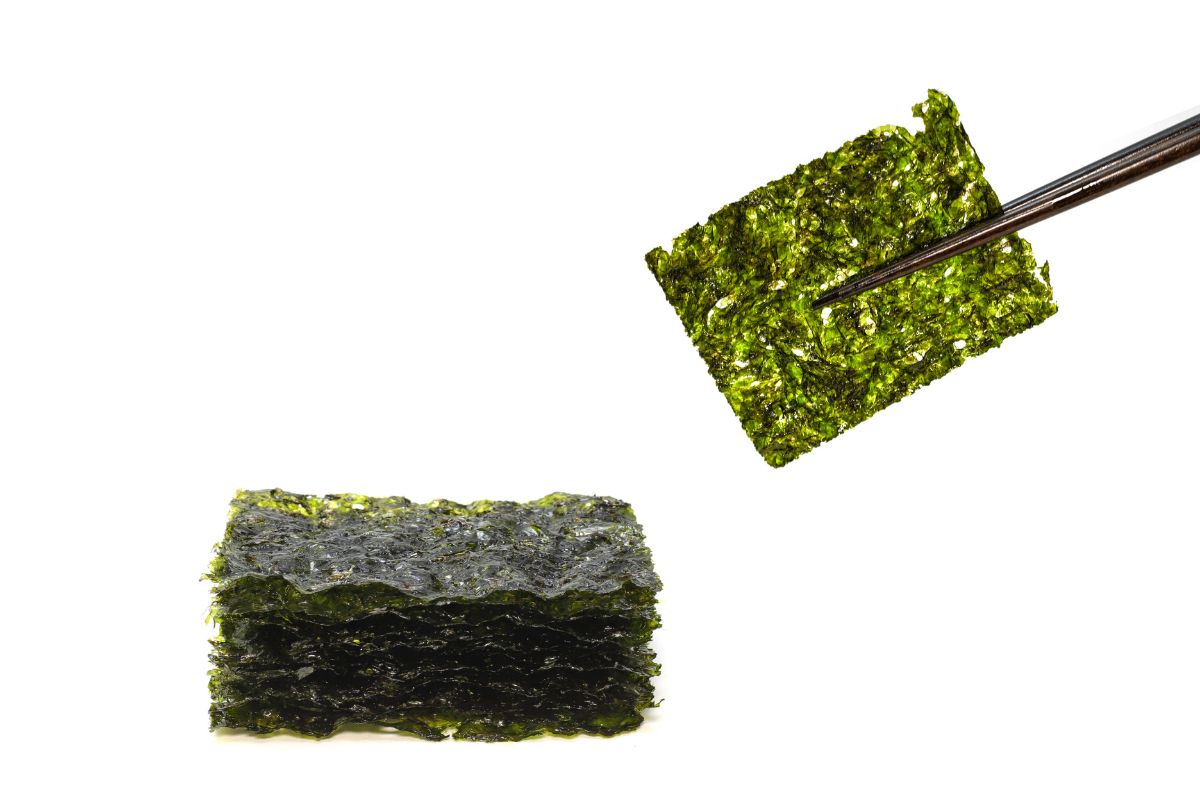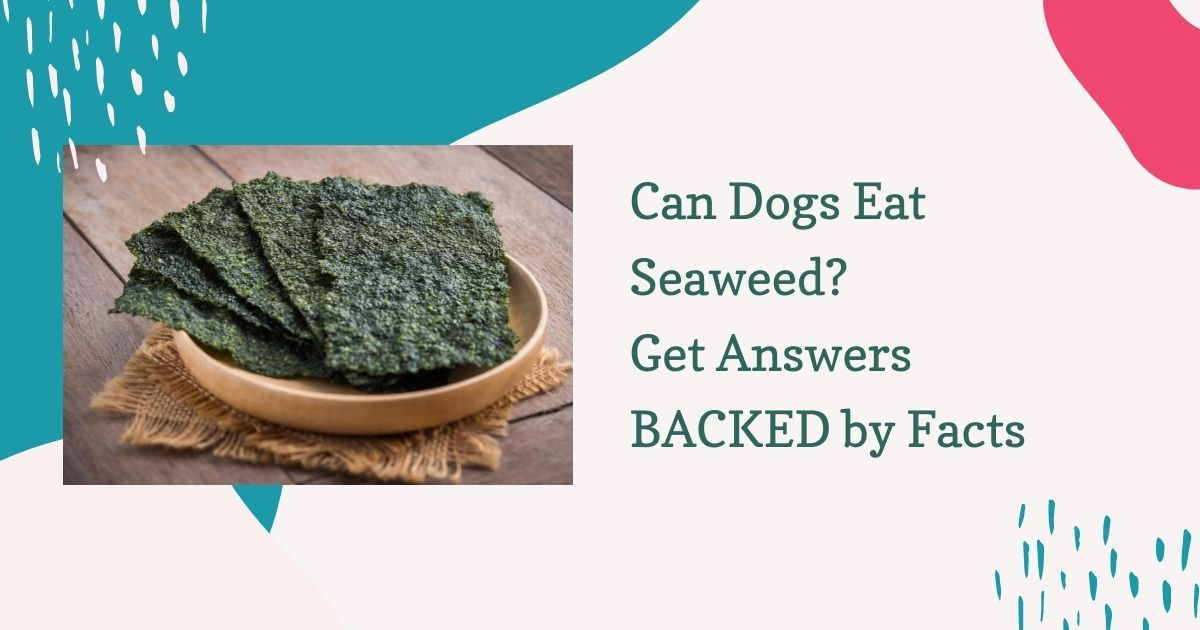Dogs and Seaweed
If you are a dog owner, you probably already know that dogs and seaweed are inseparable. But can dogs eat seaweed?
Every time we make this meal, our dog hovers around us, licks its lips, and stares us down. Sometimes it even pocks someone’s elbow!
This behavior has got us wondering: can dogs eat seaweed snacks? And is seaweed bad for dogs? If you are concerned about this too, this article is for you.

Can Dogs Eat Seaweed?
Yes. Dogs can eat seaweed treats and supplements so long as they have no salt, onions, or garlic. Edible seaweed is becoming more popular among health enthusiasts, and for a good reason. We enjoy eating sea vegetables in salads and sandwiches. The nutrients that make seaweed great for human health can also be valuable to dogs.
Is seaweed good for dogs? Seaweed promotes healthy skin and fur in dogs. So naturally, seaweed is as beneficial to your dog as it is to you, but with a few limitations.
Is Seaweed Bad for Dogs?
Sea vegetables are safe for canines if taken in moderation. Seaweed products are a great way to add extra nutrients to your dog’s diet as it contains many essential vitamins and minerals. Packaged seaweed snacks are the safest way to add this vegetable to your dog’s diet. Such snacks are rich in iron, iodine, magnesium, and omega-3 fatty acids.
Seaweed is good for dogs if given without salt and spices. Most canines have sensitive stomachs and cannot tolerate any additives.
The Benefits and Hazards of Dogs and Seaweed
If you are a seaweed-loving dog parent like myself, I bet you are happy to have learned seaweed is safe for dogs. While there are many benefits of seaweed and nori for dogs, there are also a few risks you should be aware of. Let’s discuss the benefits and risks of feeding seaweed to your dog.
Benefits of Seaweed for Dogs
Giving your dog seaweed without any seasoning will be of great nutritional value. Seaweeds are a great source of essential vitamins and minerals. This vegetable has zero cholesterol. Feeding it to your dog will not make it gain any weight. It also contains large amounts of protein and fiber. Fiber aids in digestion and absorption of nutrients.
Like other sea vegetables, seaweed is rich in trace minerals like iodine and zinc. These minerals can significantly improve the immune system of your dog.
Furthermore, seaweed has small amounts of 6 fatty acids, omega 3, choline, and vitamins A, B, C, and E. Seaweed promotes healthy skin and tissues. It may also increase your pooches’ cognitive ability. Seaweed snacks are rich in protein and will keep your canine energetic and active for a long time.
According to research, eating dry algae can also improve the endocrine glands, which is vital for the proper functioning of your dog’s thyroid gland.
Hazards of Seaweed for Dogs
You can feed your dog seaweed in moderation and regularly, as long as it is the edible type. Mixing nori for dogs or seaweed supplements with your dog’s food will not harm it. So long as you stick to the recommended amount, do not go extreme.
Seaweed that contains spices and ingredients can be harmful to your dog. For example, avoid salted seaweed. You should also ensure the seaweed you buy for your canine has no garlic or onions. Seasonings and spices do not agree with most dogs’ stomachs, so it’s better not to risk it.
The other seaweed that may be harmful to your pup is the one found on beaches. If you regularly take your dog for a walk at the beach, keep it close and away from any seaweed washed to the ocean shore. Wild seaweed found on beaches during summer can harm your dog in many ways.
First, seaweed on beach shores is full of toxins, which can harm your furry friend. Ocean water is usually salty; as mentioned above, dogs seaweed should not have salt. Therefore, consuming such seaweed may cause your dog to have salt toxicity.
Don’t forget all sorts of creatures hiding in the seaweed, waiting for their next victim, which could end up being your dog! Such creatures include jellyfish and shellfish, which could cause your dog a severe allergic reaction if consumed.
The biggest risk associated with beach seaweed is that it will expand in your pooches stomach once ingested. Beach seaweed usually dries up while lying on the beach. But once it absorbs juices from your dog’s stomach, it will quickly expand to full size. When expanded, seaweed can cause a deadly intestinal blockage.

Can Dogs Eat Nori?
Can dogs eat nori seaweed? This is a common question asked by Japanese dog owners. Nori is a red algae commonly used in classic Japanese dishes such as sushi rolls. Nori comes as dry, crispy sheets of seaweed for rolling sushi. These sheets are also commonly referred to as seaweed paper. Can dogs eat seaweed sheets, and can dogs eat seaweed paper?
Norri can be a nutritious and tasty snack for canines. So long as you do not add spices like salt, garlic, or onions. Dogs seaweed is beneficial for your dog as it has plenty of magnesium, iron, iodine, and fatty acids. Nori for dogs is also rich in vitamins A, C, and E. Moreover, 44% of its dry weight is protein, a critical element of the best dog foods. Read our article and find out Can Dogs Eat Pickles?
Seaweed Poisoning Symptoms in Canines
As you know, dogs eat whatever they find. Once your dog gets used to the taste of seaweed, it’s likely to eat dry seaweed while playing by the beach. The result of eating wild seaweed can escalate quite fast. You must monitor your dog carefully if you suspect it has eaten some.
Keep an eye out for symptoms of stomach issues such as diarrhea, vomiting, and loss of appetite. Your dog may also appear to be in pain. If your dog shows any of these signs after eating wild seaweed, contact your vet immediately! Do not leave the matter unaddressed because the consequences can be fatal.
Safely Feeding Your Dog Seaweed
Although seaweed is safe and nutritious for dogs, you should give it to your dog in moderation. As mentioned, feeding your plain dog seaweed is the safest way to give your dog this veg.
When buying seaweed snacks, ensure the package has no salt, garlic, or onions. Also, cut the big sheets into smaller chewable pieces, so your dog does not choke.
If it’s the first time you are giving your dog this veg, serve very little and see how your dog responds. Read the label well to avoid feeding your dog with harmful ingredients that some sea vegetables have. Although seaweed has many nutrients, some dogs cannot tolerate sea vegetables.
Sprinkling seaweed supplement on your dog’s meals is the easiest way to add this vegetable to its diet. Although dog seaweed is salty, this snack has little sodium, making it a tasty, safe, nutritious snack. The only thing you must be careful about is the amount of seaweed you feed your canine.
The other thing to remember when giving seaweed to dogs is that your dog has access to plenty of clean and fresh water. Easy access to clean water will ensure that whatever your dog consumes gets washed away. Water also helps in digestion.
You must consult your vet before adding anything to your dog’s diet, including seaweed. Your vet will advise on how much seaweed your dog should take and if the high iodine can affect any medication your dog is on.

Final Thoughts
If you were unsure if dogs can eat seaweed, the answer is yes! Dog seaweed is a tasty and nutritious snack that can improve your pups’ general health. Nori for dogs is also a great source of essential vitamins and nutrients.
Beach seaweed is harmful to your dog, and you should avoid it at all costs. Ensure you keep your dog close during beach walks. If your hairy friend takes some, you should:
- Call your vet immediately.
- Observe your dog for signs of stomach upset.
- Rush your dog to the vet if they have abdominal pain, diarrhea, or vomiting.
The bottom line is that sprinkling your dog’s food with seaweed supplements will make it tastier and more nutritious. Just remember to be moderate!
How about your dog? Does it like seaweed?


2 thoughts on “Can Dogs Eat Seaweed? Get Answers BACKED by Facts”
Comments are closed.